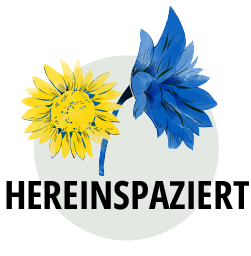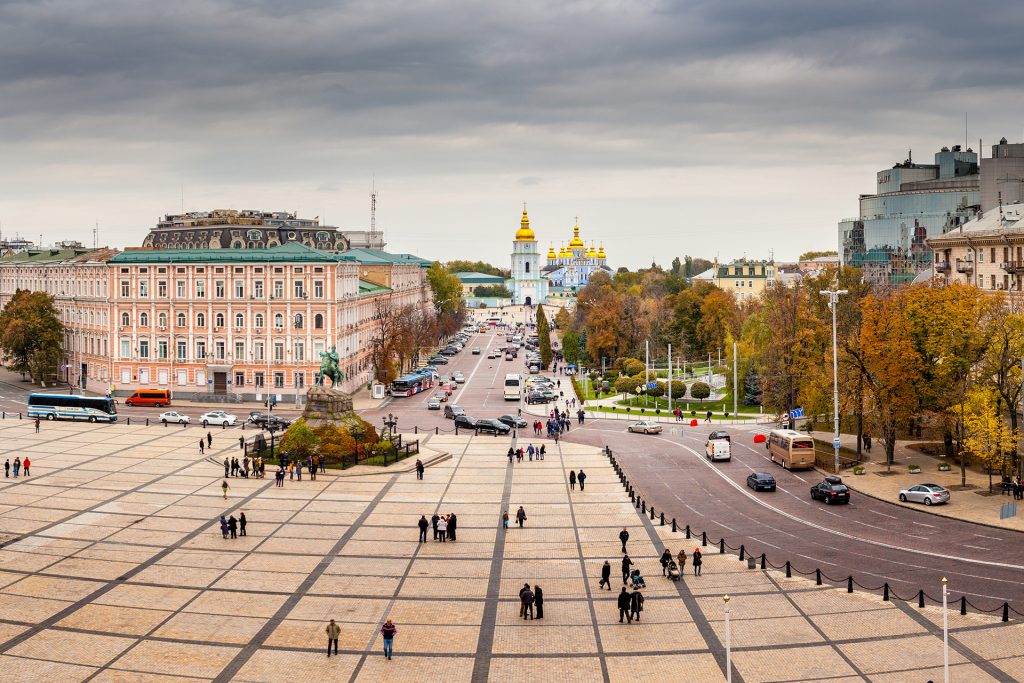
Ukraine is a fascinating country with a beautiful culture and its very own customs. A wonderful way to make Ukrainian refugees feel welcome is to take an interest in the place they love and probably miss very much. To help you get started, here are a few things you should know:
Things to know about ukraine and its people
Ukraine is the second largest country in Europe. It is located in Eastern Europe and covers an area of 603,628 km2. It is an ancient land with rich traditions and history dating back to the 8th century. It has strong Slavic roots, which strongly influence the daily life and customs of the inhabitants.
- The capital: Kiev (The German spelling is based on a transliteration of the Russian spelling. Ukrainians prefer the Urkaine Kyiv).
- Population: With over 40 million inhabitants, Ukraine is the eighth largest nation in Europe.
- Currency: hryvnia, also called hryvnia or hryvnia; coins/cents are called kopiyky
- Geography: Due to its size, Ukraine shares borders with several countries: Belarus, Poland, Slovakia, Hungary, Romania, Moldova and Russia. Ukraine has two southern coasts, the Sea of Azov and the Black Sea.
- Language: The national language is Ukrainian. Many people in the country also speak Russian as a second language (almost 30% of the population). After these two languages, English, German, French and Spanish are the most widely spoken languages.
- Politics: Ukraine is a republic with a mixed parliamentary/presidential system. The government consists of three branches: the legislative, the judicial and the executive.
Largest cities (by population)
- Kiev – 2.9 million
- Kharkiv – 1.4 million
- Odessa – 1 million
- Dnipro – 980,000
- Donetsk – 900,000
- Zaporizhia region – 720,000
- Lviv – 720,000
- Kryvyi Rih – 610,000
- Mykolaiv – 475,000
- Mariupol – 430,000
Religion
Christianity is very present in Ukraine. The country is home to the second largest Eastern Orthodox population in the world. Even if a Ukrainian does not practice this religion, his customs and traditions are likely to be influenced by Orthodox customs.
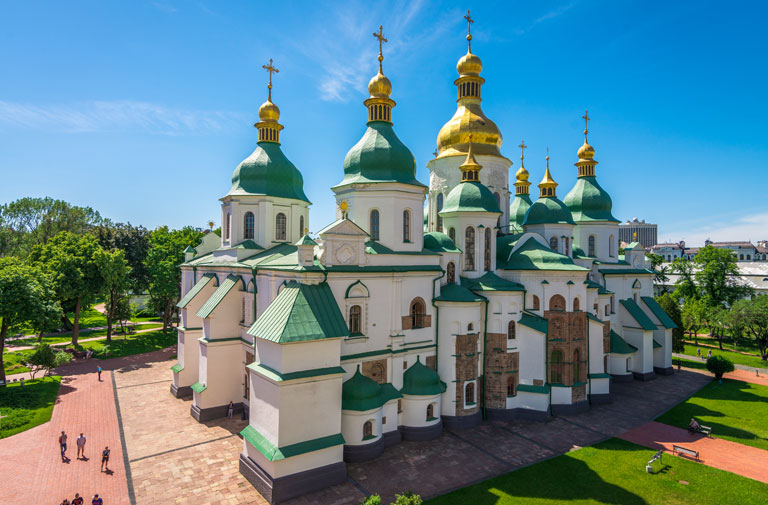
Oblasts and regions
Ukraine is divided into 24 different regions called oblasts. Since Ukraine is governed by a single government, these oblasts are administrative units and have small regional differences (a German example is Bavaria, Saxony, Hesse, etc.).
The oblasts from which a person comes may have some influence on their culture and customs. For example, the political views of a person from Western Ukraine may differ from those of Eastern Ukraine. A person from eastern Ukraine is also more likely to speak Russian as a second language, while someone from a western oblast is more likely to speak English or another European language.
Important holidays and events
Many holidays in Ukraine are celebrated according to the Orthodox calendar and fall later than holidays in Europe. For example, Easter is often celebrated a week after the Catholic feast, and New Year in 2022 was celebrated on January 3.
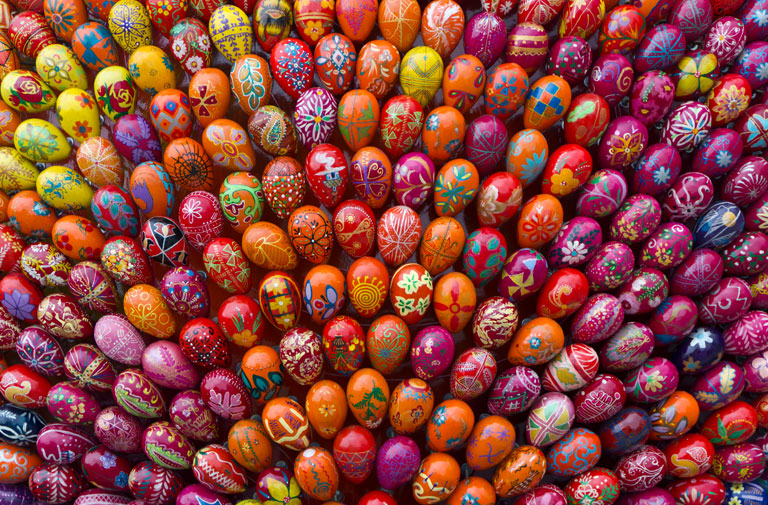
Easter – April 17, 2022
Due to its Orthodox roots, Easter in Ukraine is an extremely important holiday that focuses on the church and the family. It is a tradition to celebrate a great feast at Easter. Typical dishes are meat, fish and sweet pastries. It is also common to make both pysanka and krashenka eggs. Pysanka are eggs decorated with intricate, colorful patterns that have a special folkloric meaning (this is especially common among people from Western Ukraine). Krashenka are eggs colored with food coloring. Traditionally, the krashenka is red to represent the blood of Christ, but in recent years other bright colors such as green, blue and yellow are also used.
Other holidays and their dates in 2022
- Labor Day – May 2
- Victory over Nazism Day in World War II – May 9
- Pentecost – June 12
- Constitution Day – June 28
- Independence Day – August 24
- Day of the defender of Ukraine – October 14
- Christmas Day – December 26
Important events in Ukrainian history
- 1901 – The Socialist-Revolutionary Party is founded in March of that year.
- 1932 – After World War I, Ukraine was hit by a major famine after Stalin demanded that nearly 40% of the country’s grain crop be ceded to the government. Farmers and ordinary citizens had very little food left. This led to widespread famine during the next year.
- 1990 – The first (relatively) free parliamentary elections are held in Ukraine.
- 1991 – After the dissolution of the Soviet Union, Ukraine becomes an independent state.
- 2004 – 2005 – The Orange Revolution takes place. These are a series of protests across the country (most of them in Kiev), claiming that the last elections were the result of corruption and voter intimidation. The protests were eventually successful, and a new election was ordered.
- 2014 – Russia occupies the Crimean peninsula.
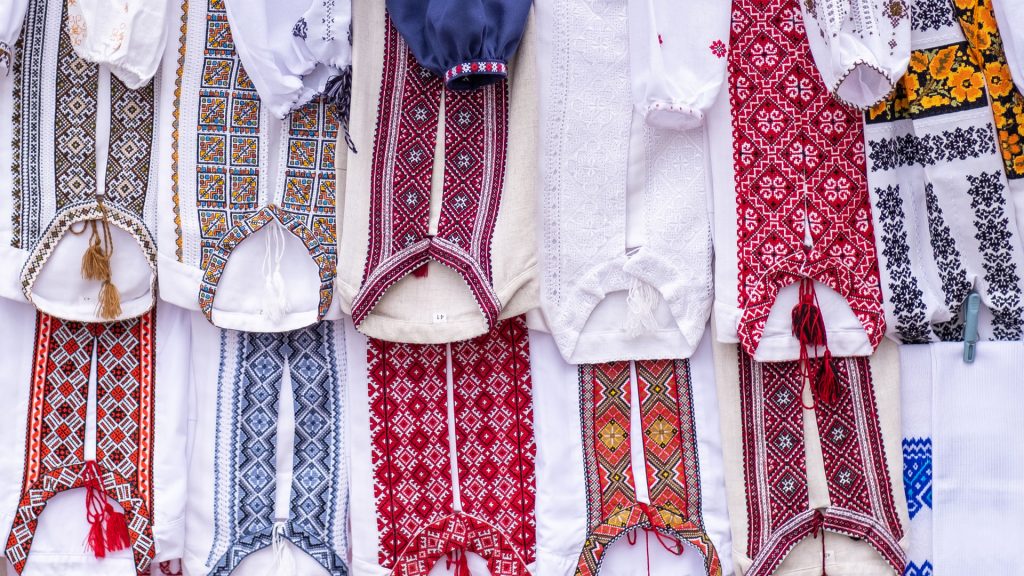
Cultural norms and taboos
- Ukrainians have a reputation for being cold, strict and aloof. This reputation comes largely from Hollywood movies and does not correspond to the reality of Ukrainians (or Eastern Europeans in general). Culturally, Ukrainians may be rather quiet and reserved in public (especially compared to Latin American countries), but they are warm, hospitable and very loyal to family and friends. They are also usually very outgoing, adventurous and extremely hardworking.
- Ukrainian customs are strongly influenced by the Orthodox Christian Church.
- Gender roles tend to be traditional, with women taking on the bulk of domestic duties and childcare.
- Ukraine is an incredibly colorful country. From the traditional vyshyvanka (an embroidered blouse) to the golden-domed churches and the intricately colored Easter eggs (called pysanky and krashenka), you see a variety of bright colors and intricate patterns throughout the country.
- Since Ukraine is a developing country that gained independence relatively recently, Ukrainians are used to a life that is likely to have some hurdles and be subject to sudden changes. Ukrainians are therefore very adaptable to changing rules and situations and have great patience.
- All social occasions in Ukraine include eating together with family and friends. Visitors are always offered something to eat and drink. It is considered rude to eat or drink in front of another person without offering them something.
- Ukrainians are very proud of their country and their heritage, which can include their religious beliefs. If you have strongly differing opinions, it is best not to start a discussion as this could be seen as aggressive and rude.
- Although Ukraine and Russia were historically linked in the past, it is important to remember that Ukraine has been an independent country since 1991. When talking about Ukrainian cities, be sure to use the correct Ukrainian name and not the Russian spelling/pronunciation.
- Also, don’t give the impression that Ukrainians and Russians have exactly the same culture, even if someone from Ukraine grew up with Russian as a second language.
- Unlike in Germany, people in Ukraine are not so strict about showing up on time. A few minutes late is not unusual and is not considered rude.
- When invited to someone’s home, it is customary to bring flowers, chocolates or a bottle of alcohol to share.
Cossacks
You have probably heard this word before in connection with Ukraine, but you may not know the whole context. The Cossacks are Eastern Slavic Orthodox Christians originally from Eastern Europe. They played an important role in the development of Ukraine and are therefore deeply rooted in Ukrainian folklore and history. Many Ukrainian fairy tales and folk songs are about Cossack heroes.
Ukrainian trivia
- Ukraine is one of the largest grain exporters in the world.
- The literacy rate is estimated at just over 99 %.
- Ukrainian boxers are among the world’s best.
- The game of chess is very popular in Ukraine. The country boasts nearly 85 grandmasters and 198 international champions.
